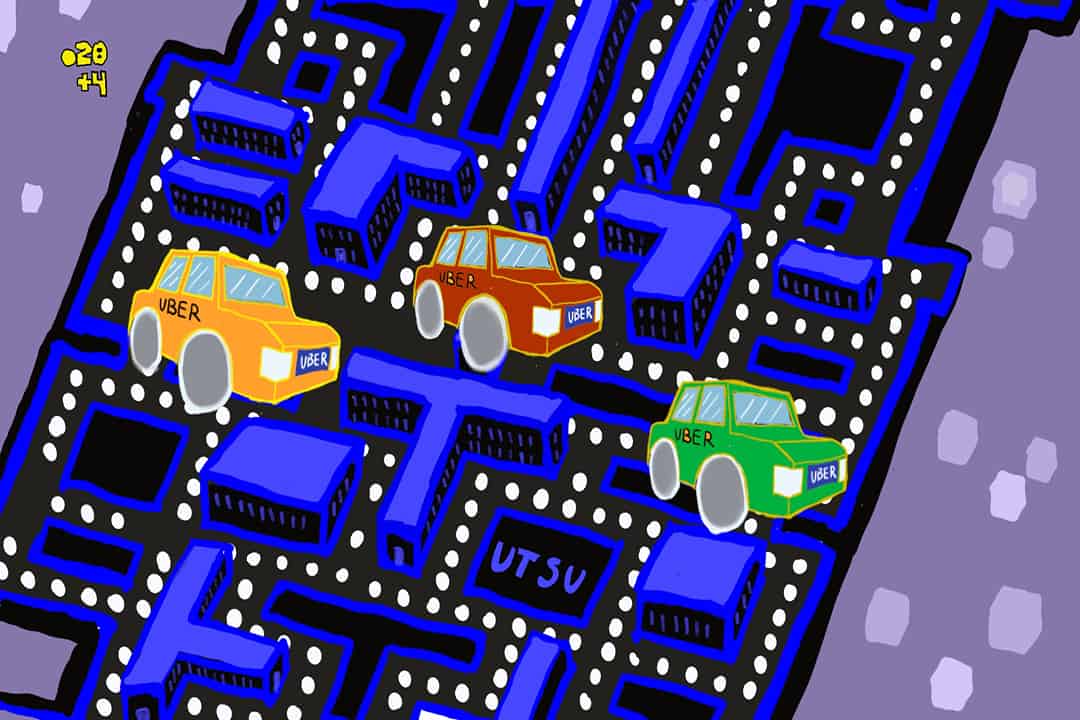The University of Toronto Students’ Union’s (UTSU) Vice-President of Student Life (VPSL), Fiona Hewes, pitched the idea for a campus-wide rideshare program during her campaign for the role of VPSL in 2023. Once Hewes was elected, the union implemented the rideshare pilot program, assisting students with a voucher to travel to and from campus via Uber within a certain radius.
However, some students noted that the program’s various iterations haven’t effectively accomplished its goal of helping students travel safely.
Pilot initiative
The UTSU introduced the first to to Rideshare Program as a pilot initiative with a budget of $15,000. It designed the program to ensure students could safely travel from 11:00 pm to 5:00 am. Students scanned a QR code that allowed them to sign up for a profile under the UTSU. From there, they could choose to bill the UTSU $10 for their Uber ride between those times. This initiative ran from October 2 to December 3, 2023, when the UTSU shut the program down due to overwhelming uptake.
In an email, Hewes told The Varsity, “The uptake of the program increased exponentially to a degree that my team had not anticipated. Thus, the program shut down about two weeks before our expected end date.”
Hewes also noted other hurdles that contributed to the pilot’s closing. “We also had issues with students using the program outside the city and Canada. We initially did not impose geographic barriers due to complications with the Uber Business portal.”
When asked about the effectiveness of the pilot program, some students feel that it fell short of achieving its intended goals.
Marisa Martel — a graduate student studying English — noted that, as a whole, she believes that the program is a necessity. However, she feels that the initial rollout was ill-prepared because the UTSU failed to anticipate a large uptake, especially given that “transit safety is of concern to many commuters.” Last year, some students voiced discomfort about using late-night transit in the wake of a perceived increase in TTC violence.
Ariane Caybot — a third-year student majoring in linguistics and sociology — also mentioned that when the program limited the radius to 7.6 km, that alienated her and other commuters who live farther away from campus.
In an email to The Varsity, Hewes wrote, “We disclosed that this program was a pilot initiative. Because it was a test run, it was precisely subject to changes (and issues). On behalf of the 2023-4 VPSL team, I thoroughly apologize to the people I let down due to lack of clarity. These roadblocks will be fundamental to how we plan to tweak the program so it helps as best as possible.”
Program reinstatement
Following the end of the pilot initiative, the union updated and reactivated the program. Now running from March 1 to April 30, the program has returned with a slew of changes.
Hewes told The Varsity that, this time around, the UTSU restricted the hours where students could access discounted Uber rides from 1:00–5:00 am to ensure that students don’t use the app as a replacement for the TTC, and to ensure the longevity of the program.
The UTSU will also track how many rides they credit to prevent the program from being overwhelmed with requests. Specifically, Hewes noted that once the program has given out 156 ride credits for the week, it will automatically shut down until the next week.
These updates were made in direct response to the issues that caused the pilot program to end prematurely. However, despite these refinements, students still appear to be divided on the overall effectiveness of the rideshare program.
Lisa Doan — a third-year student majoring in sociology — wrote in a message to The Varsity, “I think UTSU’s rideshare program is a great start for ensuring that students commute home safely.” However, Doan wrote she took issue with the new hours implemented. “I still feel like there are some equity issues, especially that the new hours from 1:00–5:00 am… do not support students like me who wouldn’t be able to get a ride home from my station when subways aren’t running.”
Hewes wants people to know that the union hears and appreciates student criticism. “This year, I aimed to establish the program’s fundamental backbones so the next VPSL could continue if they believed in it. I sincerely hope students see the program’s potential, and I am so grateful for your collaboration and patience.”



No comments to display.